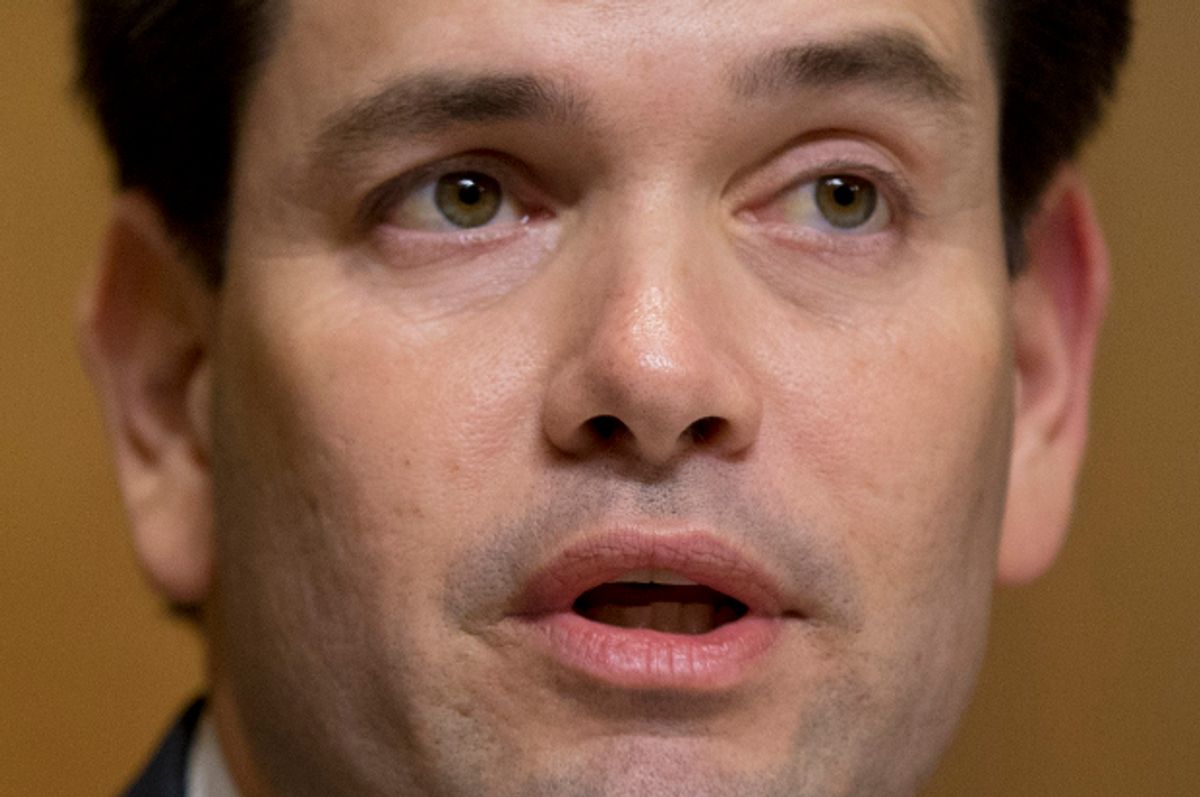Marco Rubio’s tax plan has always been fantasy. His proposal, crafted in conjunction with Sen. Mike Lee, R-Utah, sought to bridge the gap between two factions of conservative economic thinkers: the supply-side devotees who view rate cuts for top earners as the alpha and omega of tax policy, and the so-called “reformicons” who want to gently ease the Republicans away from tax-cut mania and focus more on using the tax code to bolster middle-class incomes. The solution Rubio and Lee came up with was to try to give both sides what they wanted: a reformicon-friendly expansion of the Child Tax Credit paired with across-the-board rate cuts, a slashed corporate tax rate, and the elimination of taxes on capital gains and estates.
This was quite sensibly derided by the New York Times’ Josh Barro as the puppies-and-rainbows tax plan: “It’s full of things everybody likes, at least on the Republican side: family tax cuts that will make it easier to buy the children a puppy, and capital tax cuts that chase a pot of capital investment gold at the end of the rainbow.” Deeply cutting taxes on the wealthy lowers revenue, and expanding tax credits costs money, and in doing both Rubio created a plan that would rip a gargantuan hole in the budget – the price tag is so high that he doesn’t even pretend that it can be dynamically scored into revenue neutrality.
It also suffers another potentially fatal flaw: It doesn’t account for just how single-minded and ferociously zealous the supply-siders are when it comes to rate cuts and “pro-growth” tax policy. And now the supply-siders are lashing out at Rubio for his heresies.
The Wall Street Journal published a long editorial yesterday attacking Rubio’s tax plan as a “major detour from pro-growth tax reform.” Their biggest beef is with the expanded Child Tax Credit, arguing that it “does nothing for economic growth. The only growth case for it is the Keynesian claim that it would boost consumer spending and aggregate demand, but by now we’ve seen how that doesn’t work.” Instead of wasting money on families and children, they argue, they should cut taxes for rich people some more. This is very similar to the Heritage Foundation’s critique of Rubio’s plan, which judged it to be “pro-growth” overall but viewed the expanded tax credit as a “missed opportunity” to make further cuts to the top rate.
Strangely, though, the Wall Street Journal sees the political dynamic in Congress as favoring the reformicon-oriented portions of Rubio’s plan winning out over the tax cuts they so desperately crave. “The larger political danger would arrive if Mr. Rubio became President,” they write. “In the inevitable negotiations with Congress, his tax cuts on capital would surely be watered down while his giant tax credit would pass. What happens if the economy failed to respond?”
Really? If nothing else, Rubio has shown that his tendency is to mollify the supply-siders, who still dominate the conservative establishment. The Journal may complain bitterly about Rubio’s tax plan, but the fact is that he’s already massively overhauled to make it more acceptable to the trickle-down set. As the New Republic’s Brian Beutler wrote back in April:
As originally conceived, [Rubio’s] tax plan would’ve paired modest middle class benefits with very large tax cuts for high earners, much like George W. Bush’s first big tax cut in 2001. But when conservatives voiced dissatisfaction with that particular distribution, Rubio responded not by telling them to buzz off, or by eliminating the middle-income benefits and plying the savings into further high-end tax cuts. He kept the benefits, and layered hugely regressive additional tax cuts for the wealthy on top of an already unaffordable plan. What once would have increased deficits by $2.4 trillion over a decade, according to the Tax Policy Center, would now increase them by trillions more.
In Congress, Republicans tend to take their tax policy cues from people like Paul Ryan, who is squarely in the supply-side camp, views tax cuts as the “secret sauce” of economic growth, and considers them vastly more important than expanding tax credits for middle-income families. Seems like they’d be unwilling to let a newly elected President Rubio back off his promise of zeroed-out capital gains taxes and more than happy to let the Child Tax Credit wither, if forced to choose between the two.
On a broader level, though, this entire debate is surreal. Rubio’s tax plan is already an insanely generous giveaway to top earners, and he’s already bent over backward to try to make peace with the trickle-down folks. But they’re still not happy, they’re still demanding more. There’s just no compromising to be had with extremists, I suppose.

Shares